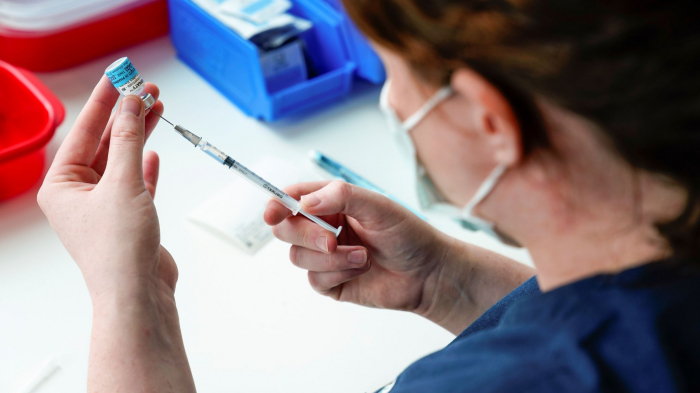A longer gap between first and second doses of the Pfizer-BioNTech Covid vaccine makes the body's immune system produce more infection-fighting antibodies, UK researchers have found.
Experts say the findings support the UK's decision on extending dosing intervals from the initial recommendation of three weeks.
An eight-week gap seems to be the sweet spot for tackling the Delta variant.
The UK initially extended the dosing gap to 12 weeks at the end of 2020.
But as the vaccination programme has been rolled out through the age groups - everyone over 18 has now been offered at least their first jab - people have been encouraged to bring their second jab forward and get it after eight weeks.
The government-funded work is published in a pre-print paper not yet peer reviewed.
For the study, the researchers compared the immune responses of 503 NHS staff who received their two shots at different intervals in late 2020 and early 2021, when the Alpha Covid variant, first identified in Kent, was rapidly spreading.
Antibody levels in their blood were measured a month after the second vaccine dose.
The findings suggest:
- both short and long dosing intervals of the Pfizer vaccine generated strong immune responses overall
a three-week schedule generated fewer of the neutralising antibodies that can bind the virus and stop it infecting cells than a 10-week interval - while antibody levels dipped after the first dose, levels of T-cells - a different type of immune cell - remained high
- the longer schedule led to fewer T-cells overall but a higher proportion of a specific type or subset, called helper T-cells, which according to the researchers, supports immune memory
Prof Susanna Duanchie, the joint chief investigator in the Pitch study, at Oxford University, said two doses were better than one but the timing of the second was somewhat flexible depending on the circumstances.
For the UK's current situation, she said: "Eight weeks is about the sweet spot for me, because people do want to get the two vaccine [doses] and there is a lot of Delta out there right now.
"Unfortunately, I can't see this virus disappearing, so you want to balance that against getting the best protection that you can."
Dr Rebecca Payne, one of the study authors, from Newcastle University, said: "Our study provides reassuring evidence that both dosing schedules generate robust immune responses against Sars-CoV-2 after two doses.
"We now need to carry out more follow-up studies to understand the full clinical significance of our findings."
Real-world data from Public Health England shows the Pfizer vaccine is effective at reducing levels of serious disease, hospital admissions and death, even after one dose.
More about:
















































